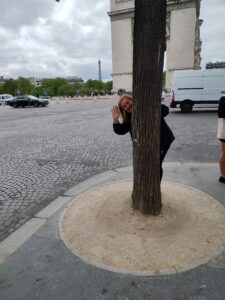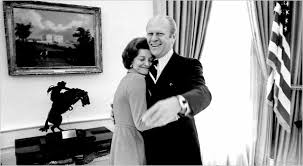
City of Three Miracles
Jaron Summers © 2024
Returned from Paris (La Ville Lumière), two weeks before the 2024 Olympic Games started.
Want to know why?
When my darling wife, Kate, and I travel, she diligently documents my escapades, and we take photos of each other. We’ve amassed hundreds of photos.
I’m proud to say that very few of them are selfies. Typically, one of us is blocking a world-famous monument or priceless art treasure.
Guess who’s in the above photo and what iconic landmark is obscured behind her?
Every time I see the Arc de Triomphe, I think of the classic line from Bogie: “You wore blue, the Germans wore gray.” Of course, it’s from Casablanca—a masterpiece penned by Howard Koch, Julius and Philip Epstein, and Casey Robinson.
When I was at UCLA—from 1968 to 1971—I used to jog around the lower campus track. Mr. Koch would occasionally join me. His experiences at UCLA, as detailed in “As Time Goes By,” influenced his life and writing.
If you’d like, I can share some of our hilarious exchanges.
However, that would be a cheat since I was too intimidated to approach him. I always wanted to ask if it was true that they had no ending for the film, so they shot multiple versions.
The final version with Bogie saying, “Louie, I think this is the beginning of a beautiful friendship,” was chosen to conclude the classic film.
Back to the City of Light. For me, the light refers to what happens to my wallet every time I visit Paris. It gets lighter.
Yes, I encountered yet another pickpocket.
This time, the thief, dressed as an old lady, crowded behind me in an elevator at Charles de Gaulle Airport and jammed a suitcase into my back. What a great diversion. I saw that the old lady sported a two or three day beard.
At the same moment, I felt a hand sneak into my pocket. That wallet contained essential credit cards and documents.
I snapped my elbow into the thief’s chest and heard the delightful crunch of ribs cracking. The miscreant dropped my wallet and fled. He/she made a clean getaway.
A kind lady scooped up my wallet and handed it to me. I figured I’d have a sore elbow.
Nope. Zero pain.
On the other hand, since I’m well into senior citizen territory, I probably should have done nothing…you never know when an assailant has a knife or an ax.
Nevertheless, a warm feeling washed over me as I replayed the sound of the perp’s ribs cracking in my mind.
So many things could have gone wrong. But I managed to hang onto my wallet. That was Miracle Number One.
Now for Miracle Number Two. It was a lifesaver for me, aboard the Metro.
During the ride, I practiced some of my sophomore French with three Parisian guys.
My accent was wonky, but for some reason, I got everyone laughing—with and at me.
Too soon, the ride was over. Kate and I were swept to the exit, where I misjudged the exit steps and fell.
My body was headed for an impact with concrete which would either end my life or leave me in traction for the rest of my days.
My three traveling companions, ahead of me, turned and caught me in mid-air. Had they not, Kate could easily have ended the day as a widow.
Those three Parisians lowered me slowly to the pavement. I said, “Nice catch, guys.”
Another fellow who had struck up a conversation with Kate took my arm and escorted us to the correct platform.
We were early for our connecting flight and found a dandy waiting room for the elderly and handicapped.
We had a couple of hours before our next flight, and I was thanking my lucky stars that I was not in an ambulance on the way to the hospital with multiple fractures when a garbled announcement informed everyone within hearing range that an unidentified suitcase had been found, and the area was to be cleared of what seemed like 500 people.
The fellow in charge of the room suggested we stay where we were. He said we would be safe.
A minute later, I saw a guy of about 40 in a corner of our room who seemed confused, telling anyone who would listen that he did not know who he was or where he lived, and that he couldn’t find his package—a package that someone gave him.
Minutes later, six or seven policemen swarmed into our safe room. Half a dozen other policemen—each armed with AR-15s—guarded the door. These guys were young, excited, and ready for anything.
One Gendarme-in-training, about 21, positioned himself on the other side of a glass wall to our safe area. He had his finger on his weapon’s trigger. I prayed the weapon was on safety.
He was caught up in an intense conversation and didn’t seem to care where his weapon pointed. And that happened to be right at my head.
I figured if he touched his trigger and the safety was off, I wouldn’t live to see the glass partition shatter or hear the report of his AR-15 as a stream of bullets riddled my body.
I told Kate we had to leave. She said it was safe. We probably wouldn’t be killed.
As usual, Kate was right. I lived without a scratch. That was the third miracle in La Ville Lumière.
You might wonder why Kate and I didn’t stay in Paris for the 2024 Olympics.

Subtitles.
Meet the locals.
Safety.
Kate and I are both close to 80. Like most people, we have a large flat-screen TV. We don’t hear well, so we turn on the subtitles and replay functions.
And if we need a snack, we pause everything and head for our kitchen. A cup of great coffee is only 20 cents if we make it ourselves, and it’s fresh. Ditto for popcorn and hotdogs.
From our bedroom, we see much more of the events than most of those who have paid a fortune for tickets so far from the action that you need a Hubble Telescope.
As for meeting the locals, most of them have been subject to countless lectures on what their city will make from tourism. So, in most cases, everyone in Paris was super nice to us.
But by the time the Olympics started, they were sick and tired of the traffic, the crowds, and the tourists. We were long gone and in our tiny condo in LA, that+ meant that we did not have to pay $500 or more for a night in an overbooked Paris hotel.
The time to meet the locals is before the big events happen.
So what about safety? Try navigating your way through the Olympics when a hundred thousand spectators are squishing you.
Heaven help you if you end up in the midst of a brawl between fans from different countries.
No, thanks. Kate and I like going early and coming home before chaos erupts.
If things go wrong for spectators on-site, we’ll view the stitches and black eyes from the comfort of our little condo.
Viva France and its 15,000,000 + spectators!
Kate and I love Paris but we’d rather see the Olympics on TV. I guess we’re fuddy-duddies. Meet another 50,000,000 or so ….
From ChatGPT: The Paris 2024 Olympics have drawn significant global viewership. The opening ceremony alone attracted nearly 29 million viewers in the U.S., making it the most-watched since the London 2012 Olympics (TheWrap) (TVB – Local Media Marketing Solutions). The first three days of the Games saw an average of 34.5 million viewers across NBC and its platforms, a 79% increase compared to the Tokyo 2021 Olympics (TVB – Local Media Marketing Solutions). Additionally, the opening Sunday coverage reached 41.5 million viewers, almost doubling the numbers from the opening Sunday of the Tokyo Olympics (TheWrap). This surge in viewership highlights the global interest and engagement with the Paris 2024 Olympics.



